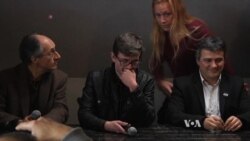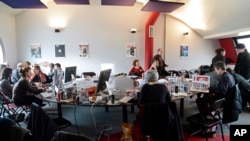The publishers of Charlie Hebdo said the Prophet Muhammad will be on the cover of the next issue, which comes out on Wednesday.
In a preview released to media this week, the cover shows a weeping Prophet holding a sign saying "I Am Charlie" and standing under the headline "All is Forgiven."
The Charlie Hebdo staff held a news conference in Paris on Tuesday, saying they were publishing this edition "with joy and pain."
Editor in chief Gérard Biard told news agency France Info the cartoon by Renald Luzier, known by the pen name "Luz," was not meant to be read as Muhammad offering forgiveness.
"It is we who forgive, not Muhammad,” he told France Info. But Biard said he has yet to pardon the attackers.
"We asked ourselves, how we could still be us, how we could keep laughing, with a front page about an event that hit us so hard?" Biard told France Info.
Weeping Prophet
Cartoonist Luzier said the staff talked about the cover for days and came up with the idea together. He said the terrorists who attacked the staff "wanted to promote hatred," but he wanted to present the Prophet in a sympathetic fashion, which is why Muhammad is shown crying.
Luzier explained how he saw the art of drawing as a means to simplify a complicated world.
"For the longest time we thought that trying to explain the world with drawings like when we were children would protect us from people's stupidity. But it didn't, not quite," he said.
He added: "If any good came out of this horrible event, it's that it was a long time since people took to the streets of Paris to express themselves, and it's been too long that too few magazines like ours exist in France."
Editor Biard said, "We would like to tell you that there will be a future for Charlie Hebdo. ... We don't yet know what that will look like, but there will be no interruptions in the publication."
Biard also thanked "all the institutions, anonymous people, personalities who are Charlie and who have thanked us."
The new edition of Charlie Hebdo, known for its satirical attacks on Islam and other religions, will include other cartoons featuring the Prophet Muhammad and also making fun of politicians and other religions, its lawyer, Richard Malka, said.
"We will not back down, otherwise none of this has any meaning," Malka told French radio. "If you hold the banner 'I am Charlie,' that means you have the right to blaspheme, you have the right to criticize my religion."
There was no official reaction from the government on the weekly's decision.
Increased publication run
The publishers of the first post-terror attack issue of the magazine said they plan to run at least 3 million copies. Charlie Hebdo usually prints about 60,000 copies every week. Newsagents reported that large numbers of customers around the country were placing orders, which led to the increase in copies.
A double-page spread in the issue claims that more people turned out Sunday to back the magazine “than for Mass.”
The post-attack issue will be available in six languages, including English, Arabic and Turkish, Biard said at the news conference. Only the French, Italian and Turkish versions will be printed. The other three -- English, Spanish and Arabic -- will be offered in electronic form, he said, according to the French news agency AFP.
Several of the Western TV outlets that reproduced the cartoon issued a warning to viewers first. And Britain’s Guardian newspaper printed on its page: “Warning: this article contains the image of the magazine cover, which some may find offensive.”
French Muslim leaders on Tuesday urged their community to keep calm and respect the right to freedom of expression.
“What is uncomfortable for us is the representation of the Prophet,” Abdelbaki Attaf told Reuters at the funeral in the northern Paris suburb of Bobigny of Ahmed Merabet, the Muslim policeman shot trying to defend the Hebdo cartoonists.
“Any responsible Muslim will find it hard to accept that. But we shouldn't ban it,” said Attaf, himself an administrator at the mosque in nearby Gennevilliers occasionally visited by Cherif Kouachi, one of the Hebdo killers.
Caricature called racist
Egypt's Grand Mufti warned the French satirical newspaper Charlie Hebdo on Tuesday against publishing a new caricature of the Prophet Mohammad, saying it was a racist act that would incite hatred and upset Muslims around the world.
“This edition will cause a new wave of hatred in French and Western society in general and what the magazine is doing does not serve coexistence or a dialog between civilizations,” the office of Grand Mufti Shawqi Allam, one of the region's most influential Muslim clerics, said in a statement.
“This is an unwarranted provocation against the feelings of ... Muslims around the world," the statement read.
However, the Grand Mufti described the attack on Charlie Hebdo as “terrorist” and Egypt's Al-Azhar, a thousand-year-old seat of religious learning respected by Muslims around the world, has referred to the attack as a criminal act. But they have also been critical of caricatures of the Prophet, which provoked protests when they were first published in 2005.
The attacks
On Sunday, at least 3.7 million people throughout France took part in marches of support for the magazine and freedom of expression. World leaders linked arms to lead more than a million people through Paris in an unprecedented homage to the victims.
Two Islamic extremist brothers, Cherif and Said Kouachi, massacred 12 people at the magazine's office last week. Charlie Hebdo is known for cartoons that poke fun at Islam and other religions, as well as public figures.
French police ambushed and killed the brothers Friday -- the same day another Islamic militant, Coulibaly, attacked the kosher supermarket before being killed by police. Coulibaly had killed French policewoman Jean-Philippe one day earlier.
Some material for this report came from Reuters and AFP.







